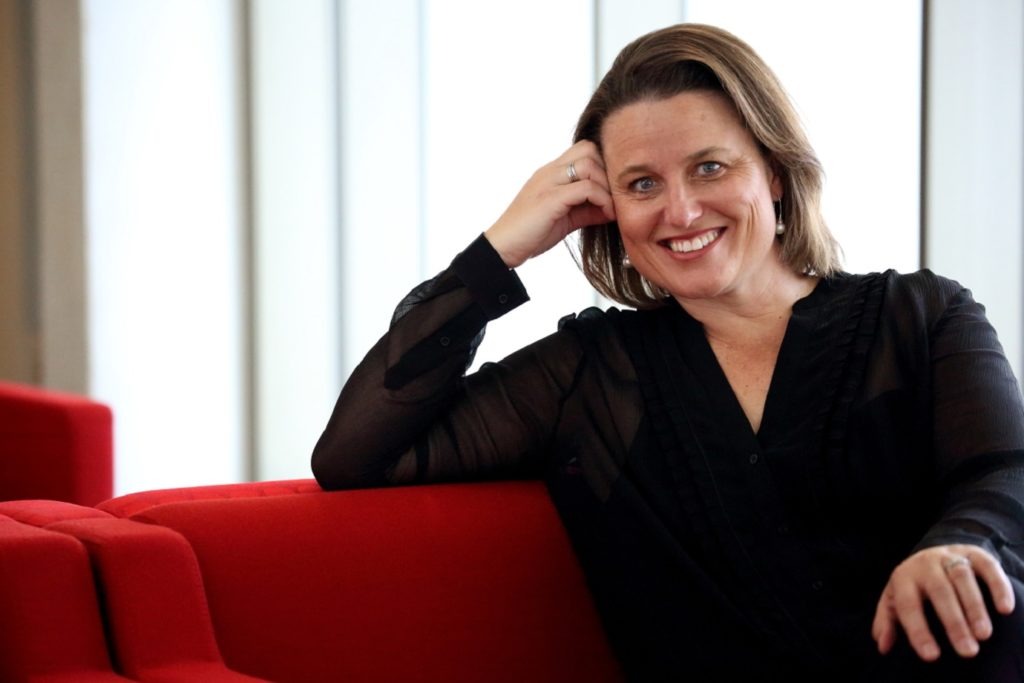If business leader Dr Kirstin Ferguson is really honest, it wasn’t until late in her career that she became conscious of the structural barriers that women face rising to leadership positions.
She spent much of her early career in male dominated workforces. First the military, and then in law. Most of that time, she focused on trying not to draw attention to the fact that she was a woman.
“I was very much in denial,” Kirstin tells Kate Mills in the latest episode of The Leadership Lessons, a Women’s Agenda podcast series supported by Salesforce.
“I had spent most of my career avoiding women’s events, hoping no one noticed I was female at all. Because it had been the key to my success, I had thought. Fitting in and working collaboratively in a male dominated environment.”
“I wasn’t opening my eyes to the fact that there were barely any female partners, there were barely any women leading parts of the firm that were fee earning.”
At age 35, Kirstin was offered her first board role, and 2 years later, she became a member of a listed board for the first time. And that’s when she opened her eyes.
“I was able to see across a wide range of industries, and a wide range of male dominated and non-male dominated cultures that were not embracing diverse environments. That’s when it was obvious that I needed to do something more.”
Kirstin has now spent more than a decade on boards, and is currently the Deputy Chair of the ABC. She is also a non-executive director of ASX listed companies, SCA Property Ltd and EML Payments Ltd, as well as at Hyne Timber Ltd.
While she believes it’s critical that we have more women on boards, she says for her, it’s more about there being an openness and willingness to have all kinds of diverse views around the table.
“I believe the research that shows having more women on boards leads to better performance,” she says. “But the more diverse people we can get making decisions, the better decisions we will make.”
She is conscious that while there may be (a small number) of gender equal boards out there, it’s often the case that the experiences of those men and women are too similar.
“We might have all gone to similar types of schools or have similar socio-economic backgrounds, or similar ethnicities,” she explains. “There’s still a lot of diversity that needs to be injected into those decisions.”
She also worries that now we have reached a target of 30 per cent women on ASX200 boards, businesses are taking their foot off the pedal on the diversity front.
“In 2020, there are so many other issues going on that the idea of diversity is perhaps being pushed down the list of priorities.”
Indeed, 2020 has been a year no one saw coming, and Kirstin sees the current health and economic crisis as a real life leadership experiment, especially in the political sphere. It’s here, she says, that the value of extreme transparency comes into play.
“Just telling people to stay calm is perhaps the most anxiety inducing couple of words one could hear,” Kirstin says. “The more information we get from our leaders, the more power and control we feel in an uncontrollable situation.”
Kindness and empathy are also traits that have shone through in the leaders tackling this crisis successfully, she adds.
“If you can be a leader that can simultaneously lead with kindness and empathy, while also being decisive and make decisions quickly without all the data.”
On the podcast, Kristin shares that she’s not naturally someone who likes to “put their head above the parapet”, so to speak, and considers herself somewhat of an accidental activist.
Back in 2017, just after Donald Trump had been elected to the US presidency and women were taking to the streets in outrage, Kirstin felt she needed something to brighten up her news feed.
She started the #CelebratingWomen campaign on social media, sharing the stories and photos of real women.
“I made a commitment to see if I could celebrate two women from all over the world every day for a year, and ended up celebrating 757 women from 37 countries and it was by far the most rewarding year of my life,” she says.
It led her to co-author a book, Women Kind, with Catherine Fox, which serves as a constant reminder of the brilliant things that happen when smart women get fed up. It also busts the ‘queen bee’ myth that women aren’t supportive of each other.
Asked what she sees as critical for women over the next decade, Kristin shares that all women’s voices need to be heard in decision-making spaces.
“The most critical move is the intersection of gender and ethnicity, or gender and sexuality, or gender and disability, and making sure we are representing all women, and that all women’s voices are heard. Aboriginal and Torres Strait Islander women, women with migrant backgrounds too.
“It’s not enough to keep hoping that women who look like me are sitting in those roles. Privileged white women have a responsibility to see all women in those positions.”
The Leadership Lessons podcast series, hosted by Kate Mills, is a set of interviews with brilliant female leaders across industries, sharing their perspective on the critical decade ahead.
The Leadership Lessons is supported by Salesforce.



